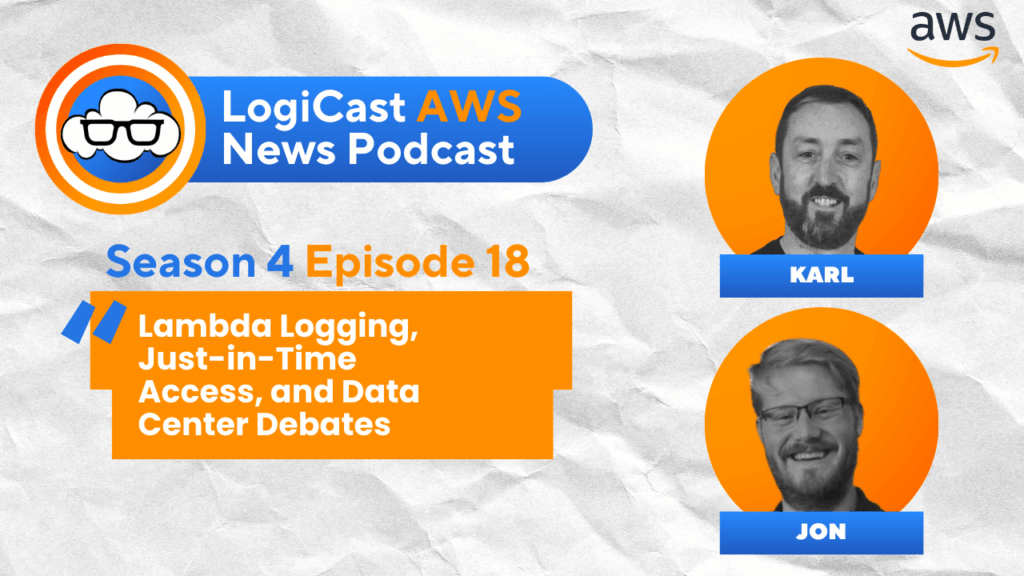
Logicata AI Bot
September 17, 2025
The Logicata AI Bot automatically transcribes our weekly LogiCast AWS News Podcasts and summarises them into informative blog posts using AWS Elemental MediaConvert, Amazon Transcribe and Amazon Bedrock, co-ordinated by AWS Step Functions.
In this week’s LogiCast AWS News podcast, host Karl Robinson and co-host Jon Goodall from Logicata discuss the latest developments in AWS services and certifications. Let’s dive into the key topics covered in this episode.
Introducing Budget Controls for AWS
The first article discussed comes from the AWS Cloud Financial Management blog, introducing a new solution for automated budget controls. Jon expressed some frustration with the misleading title, as it’s not a new service but rather a prescriptive guidance solution.
The architecture involves various AWS services such as Config, EventBridge, DynamoDB, and Step Functions. Jon, a self-proclaimed fan of Step Functions, appreciates their inclusion in this solution. The system allows for automated actions in response to budget alarms, with three main tag options: inform, stop, and terminate.
Jon explains, “When your budget for this service or your overall budget has hit a certain threshold, you can do different things. ‘Inform’ just tells you about it. ‘Stop’ can halt resources like RDS instances, Aurora, EC2s, or Redshift clusters. ‘Terminate’ is more drastic, killing the service entirely.”
This solution is particularly useful for services like EC2, SageMaker, Aurora, and OpenSearch. Jon notes that while their current setup at Logicata uses organization-level and account-level total spend budgets with anomaly detection, this new solution offers interesting possibilities for service-specific budget control.
Data Consistency with AWS DMS Data Resync
Moving on to database migration, the podcast discusses a new feature called Data Resync for AWS Database Migration Service (DMS). This feature addresses the challenge of maintaining data consistency during migrations, especially for large databases that can take days to dump and import.
Jon explains the typical migration process and how DMS with replication solves the downtime problem. However, he points out that this process can be fragile if people have write access to the target database. Data Resync aims to fix these issues without requiring a complete re-dump of the database.
Currently, Data Resync supports Oracle and SQL Server migrations to PostgreSQL. Jon expresses hope for MySQL support in the future, noting, “I’d love to see it in the MySQL ecosystem… having to restart things and taking ages and ages is not ideal.”
IPv6 Origins for Amazon CloudFront
The podcast then discusses the new support for IPv6 origins in Amazon CloudFront, enabling end-to-end IPv6 delivery. Jon emphasizes the importance of IPv6 adoption, mentioning potential cost savings as IPv6 egress pricing is slightly cheaper.
He highlights several benefits of IPv6, including:
1. No NAT (Network Address Translation) required
2. Lower latency
3. Better support for mobile-first markets
4. Improved packet processing
5. Higher connection scalability
Jon expresses some frustration with the slow rollout of IPv6 support across AWS services, especially given the charges for IPv4 addresses. He states, “It’s good that it’s coming… But why is it taking so bleeding long?”
Fargate vs. ECS: Clearing Up Confusion
The hosts briefly touch on an article comparing Fargate and ECS, noting that the comparison is somewhat misleading as Fargate is actually a capacity provider for ECS. Jon suggests that a fairer comparison would be between ECS and alternatives like Docker Swarm or EKS.
While the article may not offer much new information for experienced AWS users, Karl suggests it might be helpful for those confused about the relationship between ECS and Fargate.
Evolution of AWS Certifications: SysOps to Cloud Ops
The final topic covers the evolution of the AWS SysOps Administrator certification to the new AWS Certified Cloud Ops Engineer Associate. Faye Ellis, an AWS Hero, wrote an article detailing the changes.
Jon, who holds the older SysOps certification, expresses confusion about how the transition will work for existing certification holders. He notes, “I think this is the first time an exam’s been renamed, but it’s still got the same exam code.”
The new exam maintains similar topics but reorganizes them into five categories instead of six. It also includes coverage of newer AWS services like Amazon Managed Service for Prometheus and Grafana, AWS Network Firewall, and AWS Identity Center.
Jon speculates on the reasons for the rebranding, suggesting it might be to move away from the traditional “sys admin” connotation and reflect the evolving nature of cloud operations.
In conclusion, this week’s LogiCast covered a range of AWS developments, from new budget control solutions to certification changes, reflecting the ever-evolving landscape of cloud technology and operations.
This is an AI generated piece of content, based on the Logicast Podcast Season 4 Episode 35.





